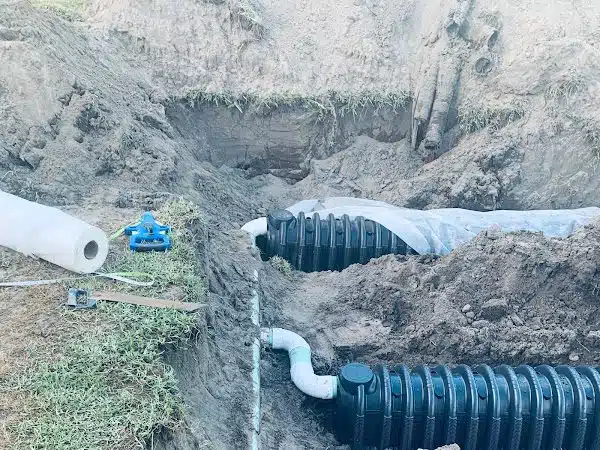SEPTIC TANK REPAIRS
The best septic tank repair is prevention, but even the most well-cared for system will fail at some point. Don’t wait, call today!
Fast, Friendly, & Affordable Septic Tank Repairs
Septic systems are unfortunately not managed by the city or municipality like centralized sewer systems are, so you are responsible for septic repair and maintenance. Fortunately, as an owner of a septic system, you are not asked to pay recurring sewer bills. Instead, you can use some of that money on septic tank system maintenance and regular septic tank repair to keep your septic system in great shape and stretch its lifetime. If you need professional assistance, call our team and we can help you schedule an appointment with one of our technicians today.

How Does A Septic System Work?
Before diving into proper septic tank system maintenance tips, we would like to explain how a septic system should work in the first place. A septic system generally includes an inlet pipe, an outlet pipe, a tank, and a drain field. These structures use nature and proven technology to treat wastewater from households. The septic tank holds wastewater long enough for the solids to break down and settle to the bottom as sludge, after which the liquid wastewater, or effluent, leaves the tank toward the drain field. The liquid effluent is discharge and percolates through soil until ultimately joining groundwater.
What Can Go Wrong?
If maintained improperly, your septic system can turn from a useful piece of modern technology into a stink-inducing monster. Though a foul odor is a sure tell-tale sign of a faulty septic system, there are other signs of a malfunctioning system.
For beginners, a septic system that is not draining correctly will lead to wastewater backing up in the household drains. If you notice that water is draining down your sinks much slower than it used to, then you have run into a red flag.
Take a look around your yard and inspect the grass and soil. Bright green and spongy grass, especially in dry climates, is a sign of sewage and waste contaminating the area. More severe cases of leakage can be identified by pooling water or muddy soil around your septic system. Surely, these areas will smell of strong odor.
Proper Septic Tank System Maintenance
Timely and appropriate maintenance will keep your septic system in tip-top operational condition. According to the Environmental Protection Agency, household septic systems should be inspected at least every three years by a septic service professional such as our team at Kelley’s Septic Service. They also note that alternative systems with electrical float switches, pumps, or mechanical components should be inspected once a year.
Septic Tank Systems Eventually Need Repairs
Like many mechanical systems, a septic system is susceptible to wear and tear. Systems that are not maintained well will require more frequent repairs, but, even so, a septic tank repair is much less expensive than replacements. A septic tank repair is easier and more affordable than ever thanks to the advancement in materials and technology we use. Here’s 5 more reason we are the right choice for your septic tank repair needs:
Honest Pricing
We do not play price games with our customers. When you work with us, you will never have surprise fees. You pay the price you are quoted end of story.
Workmanship & Parts Guaranteed
We are so confident in our technicians and products that we guarantee any and all workmanship and parts on installations and repairs.
Customer Service
All of our work is done with tyou in mind. Our technicians are hired and trained to respect you and your property. Without our customers, we would not be industry leaders.
Licensed, Insured, & Bonded
Because we are insured, you are covered in any worst-case scenario. This gives you an extra layer of protection and peace of mind. Priceless!
Emergency Service
You can call us at any time of the day or night!
Why waste your time continuing to search through web results for septic tank repair near me when our team is ready and available around the clock? For professional septic tank repair with upfront pricing, call your new friends at Kelley’s Septic Service.
REQUEST A FREE ESTIMATE
GET IN TOUCH WITH US!
If you have any questions, comments or concerns please feel free to contact us any time. We are available 24/7/365 and dedicated to taking care of all of our customer needs. If you send us an email or leave us a voicemail, we will respond to that email or voicemail as quickly as possible.
We would also love to hear about your experience with us! Please feel free to give us feedback!
OUR MAIN OFFICE
4106 Gall Blvd
Zephyrhills, FL 33542
CALL US
(813) 782-6822
